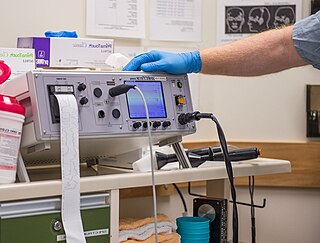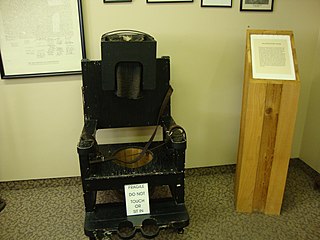
Electroconvulsive therapy (ECT) is a psychiatric treatment where a generalized seizure is electrically induced to manage refractory mental disorders. Typically, 70 to 120 volts are applied externally to the patient's head, resulting in approximately 800 milliamperes of direct current passing between the electrodes, for a duration of 100 milliseconds to 6 seconds, either from temple to temple or from front to back of one side of the head. However, only about 1% of the electrical current crosses the bony skull into the brain because skull impedance is about 100 times higher than skin impedance.

The American Psychiatric Association (APA) is the main professional organization of psychiatrists and trainee psychiatrists in the United States, and the largest psychiatric organization in the world. Its more than 37,000 members are involved in psychiatric practice, research, and academia representing a diverse population of patients in more than 100 countries. The association publishes various journals and pamphlets, as well as the Diagnostic and Statistical Manual of Mental Disorders (DSM). The DSM codifies psychiatric conditions and is used mostly in the United States as a guide for diagnosing mental disorders.

A medical guideline is a document with the aim of guiding decisions and criteria regarding diagnosis, management, and treatment in specific areas of healthcare. Such documents have been in use for thousands of years during the entire history of medicine. However, in contrast to previous approaches, which were often based on tradition or authority, modern medical guidelines are based on an examination of current evidence within the paradigm of evidence-based medicine. They usually include summarized consensus statements on best practice in healthcare. A healthcare provider is obliged to know the medical guidelines of his or her profession, and has to decide whether to follow the recommendations of a guideline for an individual treatment.

Emergency psychiatry is the clinical application of psychiatry in emergency settings. Conditions requiring psychiatric interventions may include attempted suicide, substance abuse, depression, psychosis, violence or other rapid changes in behavior. Psychiatric emergency services are rendered by professionals in the fields of medicine, nursing, psychology and social work. The demand for emergency psychiatric services has rapidly increased throughout the world since the 1960s, especially in urban areas. Care for patients in situations involving emergency psychiatry is complex.
Thyroid storm is a rare but severe and potentially life-threatening complication of hyperthyroidism. It is characterized by a high fever, fast and often irregular heart beat, elevated blood pressure, vomiting, diarrhea, and agitation. Hypertension with a wide pulse pressure occurs in early to mid crisis, with hypotension accompanying shock occurring in the late stage. Heart failure and heart attack may occur. Death may occur despite treatment. Most episodes occur either in those with known hyperthyroidism whose treatment has been stopped or become ineffective, or in those with untreated mild hyperthyroidism who have developed an intercurrent illness.
Involuntary treatment refers to medical treatment undertaken without the consent of the person being treated. Involuntary treatment is permitted by law in some countries when overseen by the judiciary through court orders; other countries defer directly to the medical opinions of doctors.
Liaison psychiatry, also known as consultative psychiatry or consultation-liaison psychiatry is the branch of psychiatry that specialises in the interface between general medicine/pediatrics and psychiatry, usually taking place in a hospital or medical setting. The role of the consultation-liaison psychiatrist is to see patients with comorbid medical conditions at the request of the treating medical or surgical consultant or team. Consultation-liaison psychiatry has areas of overlap with other disciplines including psychosomatic medicine, health psychology and neuropsychiatry.

Droperidol is an antidopaminergic drug used as an antiemetic and as an antipsychotic. Droperidol is also often used as a rapid sedative in intensive-care treatment, and where "agitation aggression or violent behavior" are present.

Blunt trauma, also known as blunt force trauma or non-penetrating trauma, is physical trauma or impactful force to a body part, often occurring with road traffic collisions, direct blows, assaults, injuries during sports, and particularly in the elderly who fall. It is contrasted with penetrating trauma which occurs when an object pierces the skin and enters a tissue of the body, creating an open wound and bruise.
Telepsychiatry is the application of telemedicine to the specialty field of psychiatry. The term typically describes the delivery of psychiatric assessment and care through telecommunications technology, usually videoconferencing. Telepsychiatry services can be offered through intermediary companies that partner with facilities to increase care capacities, or by individual providers or provider groups. Most commonly, telepsychiatry encounters take place at medical facilities under the supervision of onsite staff, though at-home models are becoming accepted as long as they are in compliance with HIPAA standards.
The psychiatric survivors movement is a diverse association of individuals who either currently access mental health services, or who are survivors of interventions by psychiatry.
Emergency ultrasound employing point-of-care ultrasound (POCUS) is the application of ultrasound at the point of care to make immediate patient-care decisions. It is performed by the health care professional caring for the injured or ill persons. This point-of-care use of ultrasound is often to evaluate an emergency medical condition, in settings such as an emergency department, critical care unit, ambulance, or combat zone.
Psychiatry is the medical specialty devoted to the diagnosis, prevention, and treatment of mental disorders. These include various maladaptations related to mood, behaviour, cognition, and perceptions. See glossary of psychiatry.
Muhamad Aly Rifai is a Syrian American internist and psychiatrist and a clinician researcher known for describing the association between psychiatric disorders and hepatitis C. He co-authored a clinical report detailing the association between hepatitis C infection and psychiatric disorders. Rifai is the Director of the Older Adults Behavioral Health Unit at Easton Hospital in Easton, Pennsylvania. He is the President and CEO of Blue Mountain Psychiatry which has locations in Pennsylvania.
The following outline is provided as an overview of and topical guide to psychiatry:
Compared with other neighbouring countries, Guyana ranks poorly in regard to basic health indicators. Basic health services in the interior are primitive to non-existent, and some procedures are not available at all. Although Guyana's health profile falls short in comparison with many of its Caribbean neighbours, there has been remarkable progress since 1988, and the Ministry of Health is working to upgrade conditions, procedures, and facilities. Many Guyanese seek medical care in the United States, Trinidad and Tobago or Cuba.

The Glore Psychiatric Museum is part of a complex of St. Joseph, Missouri, museums, along with the Black Archives Museum, the St. Joseph Museum, and the American Indian and History Galleries. The Glore exhibits feature the 130-year history of the adjacent state mental hospital, and illustrate the history of mental health treatment through the ages. It has been called one of the fifty most unusual museums in the United States.

Barry S. Fogel is an American neuropsychiatrist, behavioral neurologist, medical writer, medical educator and inventor. He is the senior author of a standard text in neuropsychiatry and medical psychiatry, and a founder of the American Neuropsychiatric Association and the International Neuropsychiatric Association.

The Coalition on Psychiatric Emergencies (CPE) is a collaborative working group of behavioral health, psychiatry, and emergency medicine professionals headed by the Emergency Medicine Foundation. COPE represents severalprofessional organizations, making it a large collaborative in the field of emergency psychiatry in the United States. COPE is a 501(c)(3) non-profit organization.
EmPATH unit is an acronym for a specialized hospital-based emergency department or outpatient medical observation unit dedicated to mental health emergencies. Unlike standard emergency departments, EmPATH units gather their patients in chairs in a central room called a milieu.









